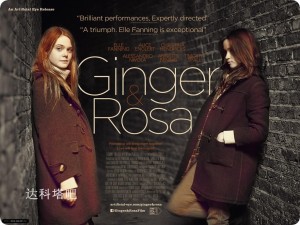GINGER & ROSA: 3 STARS
 Ginger and Rosa, the titular characters played by Elle Fanning and Alice Englert are children of the Atomic Age. Born in 1945 as the A-bomb was being dropped on Hiroshima, they grow up under a mushroom cloud of Cold War fear.
Ginger and Rosa, the titular characters played by Elle Fanning and Alice Englert are children of the Atomic Age. Born in 1945 as the A-bomb was being dropped on Hiroshima, they grow up under a mushroom cloud of Cold War fear.
Set in London, “Ginger and Rosa” is not exactly a Cold War movie, but rather, a film about best friends who are taking divergent paths in one of the most turbulent decades in history and yet the Cold War informs every second of the film.
Seventeen-year-old Ginger is a serious girl, a writer of poetry, prone to pronouncements like, “When you are aware of the bomb, happiness is not an option.” Rosa, on the other hand, is a free spirit, more interested in making love than stopping war.
The relationship of these BFFs changes when Ginger’s parents—Roland (Alessandro Nivola and Natalie (Christinma Hendricks)—split and Rosa begins an affair with Roland.
“Ginger & Rosa” may suffer in comparison to “An Education,” a chirpier film from a four years ago that breathed the same air, but there is much to recommend here. Save for a bad English accent or two—I’m looking at you Christina Hendricks!—the performances are top notch.
Elle Fanning, sister of Dakota, was just fourteen years old when she took on this role but delivers a standout performance well beyond her years. Englert (daughter of director Jane Campion) in her screen debut hands in a poignant performance, ripe with tragedy and confusion.
Supporting cast, including Annette Bening, Oliver Platt and Timothy Spall don’t have as much to do, but bring with them solid chops that bring their scenes to life.
Their relationship is at the center of everything that happens in the film and forms a believable core to build the story around.
Director Sally Potter (“Orlando,” “Yes” and “The Man Who Cried”) takes her time with the story, building compelling characters—Nivola is particularly interesting as the self-absorbed father who uses his political convictions as an excuse for his sleazy behavior—and avoiding the clichés of the time period. Cool jazz and early rock and roll decorate the soundtrack, but instead of a passé Swingin’ Sixties look she has opted for a gritty post war feel that more suits the story.
“Ginger & Rosa” isn’t an easy movie. The main characters are forced to grow up quickly, perhaps too quickly. “Can’t you be a girl for a moment or two longer,” asks one of Ginger’s teachers, and one can’t help but wonder if the film might have felt a little less melodramatic if Ginger and Rosa had been allowed time to mature rather than having real-life problems thrust upon them so suddenly.
